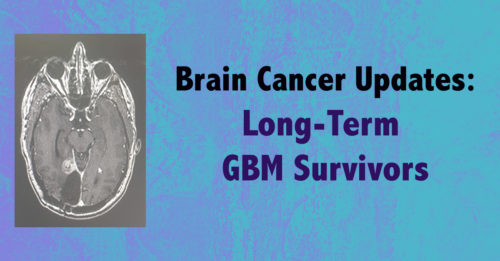
Since Senator John McCain was informed in July 2017 that he had a glioblastoma multiforme (GBM), public attention provided some focus on GBM research, clinical trials, and treatments against this extremely complicated disease.
Other high-level individuals in the spotlight who have died as a result of GBMs—include Senator Edward Kennedy and Vice President Joe Biden’s son, Beau Biden, a former attorney general.
The disease needs urgent attention with solutions to save lives. Indeed, all players in Washington, DC must support government funding for brain cancer research.
I lived in Washington, DC from 1997 to 2004, working in the U.S. Congress from 1996 to 2000. Diagnosed with a brain tumor in 1998 at age 24, pathology reports informed me that I had a Grade II oligo-astrocytoma. Over time after treatments and other strategies, in 2013 my situation went to a Grade III anaplastic astrocytoma.
In adults, a GBM treated with standard of care has the median survival around 14.6 months, and two-year survival at 30%. Fortunately, there are some GBM survivors who survive those odds. Sharing a snapshot, in different categories, this information demonstrates only a part of ‘what’s happening’, research, clinical trials, more recent FDA approved treatment, integrative cancer care, and other topics.
Touching on Complexity
The disease comprises tremendous genetic diversity. The heterogeneity of a ‘GBM’ is not one disease being treated. Instead, the GBM cancers have different subtypes. Therefore, each unique GBM patient may respond to different treatments, and experience different outcomes.
Further genetic sequencing can also be helpful, as well as genomic testing to potentially identify treatments such as targeted therapies and some immunotherapies. Additionally, understanding biological diversity must be included to treat each individual. Precision medicine is paramount.
Immunotherapy with a DCVax-L Dendritic Cell-Based Vaccine
DCVax-L provides personalized cancer vaccines designed to treat GBM patients, mobilizing the entire immune system and targeting biomarkers in patients. Current findings are forthcoming.
Although not always the case for all GBM patients receiving DCVax-L, I have met some long-term GBM survivors treated with DCVax-L at UCLA. They include: Jennifer Sugioka, a 17 year GBM survivor; Brad Silver, a 14 year GBM survivor; Elijah Luyten, MD, a 10 year GBM survivor; Gallia Kistler, a 6 year GBM survivor; and, Jamil Newirth, a 6 year GBM survivor.
Optune
FDA approved Optune that impacts low-intensity electric fields, which may slow or stop cancer cells from multiplying and cause them to die. TTFields are delivered through a wearable, portable device. On a daily basis, Optune is applied to the shaved scalp and must be worn at least 18 hours each day. The EF-14 clinical trial in April of 2017 showed new data from all 695 patients, with a median follow-up of 40 months. Optune says, “The two-year survival rate increased from 30 percent to 43 percent for patients treated with Optune together with temozolomide versus patients treated with temozolomide alone. The five-year survival rate increased from five percent to 13 percent for patients treated with Optune together with temozolomide versus patients treated with temozolomide alone.”
Nutritional Solutions
Jeanne M. Wallace, PhD, CNC, founder of Nutritional Solutions, is a nutritional oncology expert, and with her team member Michelle Gerencser, MS, have helped many GBM patients. She explains: “Cancer cells don’t exist in isolation, they’re influenced by the environment within the body. The Oncometabolic Milieu is a cluster of nutritional, metabolic and hormonal factors that interact with cancer cells. This critically-acclaimed program synthesizes the findings of hundreds of published research studies—on nutrition and your specific type of cancer—into a coherent and comprehensive action plan.”
Although not always the same for each GBM patient, remarkable stories involved with Nutritional Solutions include: Cheryl Clark, a 19 year GBM survivor; Cheryl Broyles, a 17 year GBM survivor; Meredith Moore, a 12 year GBM survivor; and, David Servan-Schreiber, MD, PhD, author of Anticancer, a GBM survivor who ultimately lived for almost 19 years.
More Insights about Long-Term GBM Survivors
These are only some of the individuals currently living as long-term GBM survivors, surviving against the odds.
- Kathleen Rhodes – 25 year GBM survivor – many treatments
- Ben Williams – 22 year GBM – many treatments, authored Surviving “Terminal” Cancer: Clinical Trials, Drug Cocktails, and Other Treatments Your Doctor Won’t Tell You About
- Lisa Bukkhegyi – almost 20 year GBM survivor – many treatments
- Bill Brighton – 16 year GBM survivor – surgery, radiation, experimental chemotherapy, other strategies
- Greg Cantwell – 12 year GBM survivor – conventional treatments, clinical trials, a positive attitude, other strategies
- Ira Brown – almost a 6 year GBM survivor – standard of care, integrative cancer therapies, self-care, alternative approaches
- Michael Yutkin – almost 5 year GBM survivor – standard of care, a clinical trial at UCLA testing Velcade (bortezomib) as a targeted therapy (approved by FDA for multiple myeloma), Nutritional Solutions, a ketogenic diet through UCLA, emphasis on love with his family
Summary
Indeed, certain treatments, clinical trials, therapies, and self-care strategies have helped some GBM patients’ survivorship.
Goals are necessary: motivation, proactivity, and commitments to incorporate innovative plans for GBM patients. Embracing courage and compassion plays a critical role, expansively supporting people in their journey.
If you would like to learn more about strategies to deal with brain tumors, conventional treatments, integrative cancer care for the whole person, and unique forms of support in your cancer journey, contact me today for personalized cancer coaching. A team approach with a cancer coach is invaluable. Find how cancer coaching works here.





